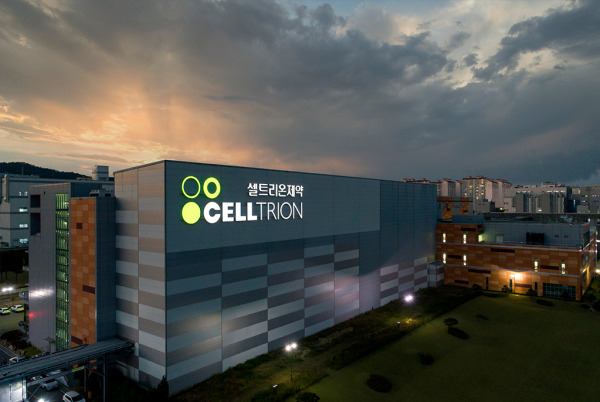 |
Celltrion's headquarters in Yeonsu-gu, Incheon (Celltrion) |
South Korea's biopharmaceutical firm Celltrion said Tuesday it aims to have five additional biosimilars approved by the end of this year in a bid to dominate the global market worth 100 trillion won ($78.5 billion), along with its existing six products.
According to Celltrion, the firm plans to obtain approval for the global licenses of five of its biosimilar products by the end of 2023 to hit the market by 2025.
The company has six of its biosimilar drugs currently being sold abroad. The biosimilar drugs that previously gained approval for sale in the global market include Celltrion's Remsima, Truxima, Herzuma, Remsima SC, Yuflyma and Vegzelma.
The five biosimilar products Celltrion is pushing for global authorization this year include CT-P43, a reference drug for Stelara and a biologic used for treating psoriasis and Crohn's disease. The firm will submit applications for approval in major countries after getting authorization in Europe, it said.
The company submitted an application for CT-P39, a reference drug of allergic asthma treatment Xolair, to be approved in Europe in April. It also submitted an application for CT P42, Celltrion's biolsimilar for ophthalmic drug Eylea, for approval in the US.
An investigational new drug application for Celltrion's phase 3 clinical trial of CT-P41, a Prolia biosimilar, along with CT-P47, the biosimilar of Actemra, have also been submitted to the US drug regulator.
If the five biosimilar drugs each gain the necessary approvals, Celltrion will be in possession of 11 biosimilar products that will be sold in the overseas market.
"Celltrion plans to complete the application for regulatory approvals for these biosimilar products, which are currently undergoing clinical trials, within this year as much as possible," said an official from Celltrion via a statement.
"Securing five follow-up biosimilar pipelines will enable entry into new markets worth 50 trillion won, and the global market value for all 11 biosimilar portfolios (that are awaiting approval) is estimated to reach about 100 trillion won in total," he added.
Celltrion said it is also considering acquiring global biotech companies in a bid to increase its business competitiveness and create synergy in developing new drugs.
Celltrion's aggressive expansion of its biosimilar business comes as the number of its approved biosimilar products in the global market has fallen behind that of Samsung Bioepis, the firm's local rival, as of the first half of 2023.
Currently, Samsung Bioepis has taken the lead, with seven of its biosimilar products approved for sale in Europe. Meanwhile, six of Celltrion's products have been approved in the same region.






![[Today’s K-pop] Blackpink’s Jennie, Lisa invited to Coachella as solo acts](http://res.heraldm.com/phpwas/restmb_idxmake.php?idx=644&simg=/content/image/2024/11/21/20241121050099_0.jpg)
